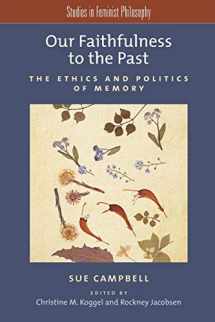
Our Faithfulness to the Past: The Ethics and Politics of Memory (Studies in Feminist Philosophy)
ISBN-13:
9780199376940
ISBN-10:
0199376948
Edition:
1
Author:
Sue Campbell, Christine M. Koggel, Rockney Jacobsen
Publication date:
2014
Publisher:
Oxford University Press
Format:
Paperback
248 pages
FREE US shipping
on ALL non-marketplace orders
Marketplace
from $43.07
USD
Marketplace offers
Seller
Condition
Note
Seller
Condition
Used - Like New
Used Like New, no missing pages, no damage to binding, may have a remainder mark.
Book details
ISBN-13:
9780199376940
ISBN-10:
0199376948
Edition:
1
Author:
Sue Campbell, Christine M. Koggel, Rockney Jacobsen
Publication date:
2014
Publisher:
Oxford University Press
Format:
Paperback
248 pages
Summary
Our Faithfulness to the Past: The Ethics and Politics of Memory (Studies in Feminist Philosophy) (ISBN-13: 9780199376940 and ISBN-10: 0199376948), written by authors
Sue Campbell, Christine M. Koggel, Rockney Jacobsen, was published by Oxford University Press in 2014.
With an overall rating of 3.9 stars, it's a notable title among other
books. You can easily purchase or rent Our Faithfulness to the Past: The Ethics and Politics of Memory (Studies in Feminist Philosophy) (Paperback) from BooksRun,
along with many other new and used
books
and textbooks.
And, if you're looking to sell your copy, our current buyback offer is $0.3.
Description
This volume brings together essays -- three of them previously unpublished -- on the epistemology, ethics, and politics of memory by the late feminist philosopher Sue Campbell. The essays in Part I diagnose contemporary skepticism about personal memory, and develop an account of good remembering that is better suited to contemporary (reconstructive) theories of memory. Campbell argues that being faithful to the past requires both accuracy and integrity, and is both an epistemic and an ethical achievement. The essays in Part II focus on the activities and practices through which we explore and negotiate the shared significance of our different recollections of the past, and the importance of sharing memory for constituting our identities. Views about self, identity, relation, and responsibility (all influenced by traditions in feminist philosophy) are examined through the lens of Campbell's relational conception of memory. She argues that remaining faithful to our past sometimes requires us to re-negotiate the boundaries between ourselves and the collectives to which we belong. In Part III, Campbell uses her relational theory of memory to address the challenges of sharing memory and renewing selves in contexts that are fractured by moral and political difference, especially those arising from a history of injustice and oppression. She engages in detail Canada's Indian Residential Schools Truth and Reconciliation Commission, where survivor memories have the potential to illuminate the significance of the past for a shared future. The study of memory brings together philosophers, psychologists, historians, anthropologists, legal theorists, and political theorists and activists. Sue Campbell demonstrates a singular ability to put these many different areas of scholarship and activism into fruitful conversation with each other while also adding an original and powerful voice to the discussion.


We would LOVE it if you could help us and other readers by reviewing the book
Book review

Congratulations! We have received your book review.
{user}
{createdAt}
by {truncated_author}


